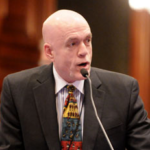By GREG BISHOP for the Illinois Radio Network
SPRINGFIELD, Ill. (IRN) — Illinois House Democrats are proposing about $1.3 billion in tax cuts for the coming year as they try to put together a state budget that seeks to spend a record $45.6 billion.
Gov. J.B. Pritzker proposed $45.5 billion in state spending in February. Despite that being the highest spending plan in state history, he also laid out about $1 billion in tax cuts.
Late Tuesday, amendments to House bills 969 and 1497 came in at a total of nearly 4,000 pages and lays out proposed tax and spending policies from majority Democrats for a budget year that begins July 1.
Total state revenues are estimated at about $46 billion. Total spending from the Democrats’ proposal would be $45.6 billion.
Details about the spending plan were revealed as the day went on Wednesday.
During a committee hearing on the plan, Republicans asked about the budget including a guaranteed income pilot program for the Metro East area costing a total of $3.6 million. Harris said this would be for a small subset of people and details would have to be developed by a state agency.
There could also be a $2,500 pay increase for lawmakers.

At a news conference Wednesday morning, House Majority Leader Greg Harris, D-Chicago, laid out some spending priorities, including paying more for state employee group health and an additional $500 million for pension debt, which could save taxpayers from paying tens of millions of interest.
“We’re adding $900 million to a rainy day fund to help cushion the state against any future downturns or any problems with a new variant of COVID,” Harris said during a news conference.
As to the remaining unemployment trust fund debt of nearly $2 billion, Harris said that’s still in negotiations between business and labor groups.
The Democrats’ proposal includes sending $100 million more for the Local Government Distributive Fund, or the share of state income taxes meant for local governments. Local governments were looking for about $500 million more than the previous year.
K-12 schools would get an additional $350 million from state funds. Democrats said during committee that there’s an across the board 5% increase for public universities.
Safety net hospitals and long-term care facilities also get priority in the budget, Harris said during a committee hearing on the plan.
Another spending proposal would free up federal COVID-19 tax funds for the hotel industry, but how much is still being negotiated. More than $250 million of federal tax funds would be used for violence prevention grants, Harris said.
With inflation at 40-year highs, the state’s tax receipts are higher than anticipated, and Harris also said they plan some tax cuts.
“We know we can’t solve every problem, but $1.3 billion can help in a lot of ways to solve some problems,” Harris said.
House Democrats’ proposals would provide a one-time income tax rebate of up to $100 per person, with $50 per child, and permanently extend the Earned Income Tax Credit. Property taxpayers would get up to $300 in rebates. They’d also suspend the 1% grocery tax and the looming gas tax increase tied to inflation. Suspending the looming gas tax could save taxpayers about $140 million. Democratic lawmakers doubled the state gas tax in 2019 – taking it from 19 cents a gallon to 38 cents – and added an annual increase in the tax tied to inflation. Gov. J.B. Pritzker signed the tax hike.
The Senate Democrats’ proposals on gas taxes would suspend the looming increase for six months. The House plan would be for a year. It’s expected the differences will be hashed out before Friday’s adjournment.
Republicans say the temporary tax relief proposals aren’t enough and permanent relief is necessary. Illinois residents pay among the highest state and local taxes in the nation.
Illinois Fuel and Retail Association President Josh Sharp said freezing a tax increase that hasn’t kicked in yet is not relief.
“I think there’s a way forward and hopefully we can get some real meaningful relief passed from gas taxes before the end of this week, something that goes beyond just stopping a gas tax that hasn’t gone into effect yet,” Sharp said.
The Republican proposal to cap the sales tax on top of the gas tax that they say would save taxpayers $1 billion doesn’t seem to be advancing.
There’s also a provision in the Democrats’ measure to require a sign on all gas pumps across the state that says the inflationary increase isn’t going into effect this year. State Rep. Ryan Spain, R-Peoria, said that should be removed from the proposal.
“It does seem like electioneering, giving further evidence to an election year gimmick,” Spain said.
There was no estimate of what the stickers would cost. The Illinois Fuel and Retail Association considers such a requirement unconstitutional compelled speech and threatened litigation if it were to pass.
Democrats did not seek to add a sticker to gas pumps alerting motorists when the gas tax doubled in 2019.
Pritzker said he’s reviewing the Democrats’ tax and spend proposals, and is optimistic.
“It’s particularly important to put away money in the rainy day fund, maintain a responsible bill-payment cycle and make an additional payment into our pension systems,” Pritzker said Wednesday at an unrelated event.
House Republicans said they’re still looking through the thousands of pages.
“This is a lot of information to get through and so we’re still working on it and we’ll be watching whatever comes from the Senate as well,” state Rep. Tom Demmer, R-Dixon, said during a House committee on the proposals.
Lawmakers are eyeing an adjournment for spring session Friday.
